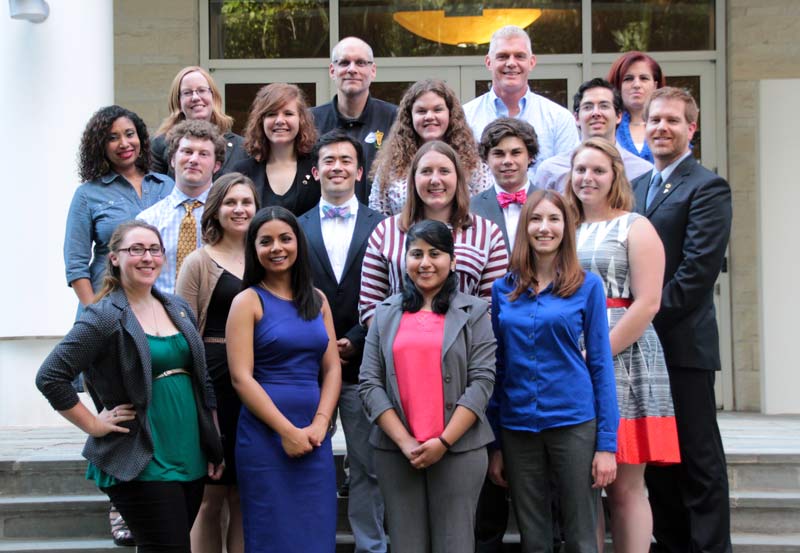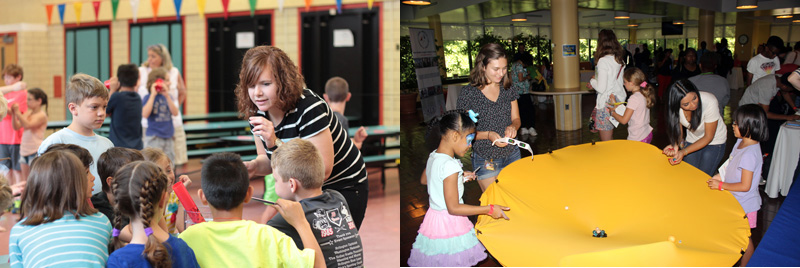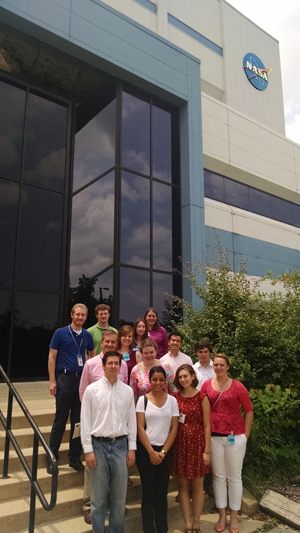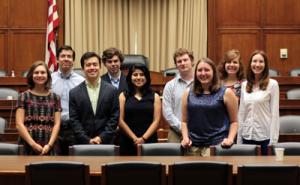Monday, September 14, 2015
By:Sean Bentley, Director of SPS and Sigma Pi Sigma

The twelve 2015 Society of Physics Students interns will have very interesting answers when asked what they did this summer. A summary of their project outcomes alone is staggering. They developed teaching materials on the history of women and African Americans in the physical sciences that will connect more students to our field; created outreach materials on acoustics that will engage children and the public in physics; performed cutting-edge research with implications in electronics, medicine, astrophysics, and beyond; prepared materials for congressional debates on critical scientific policy; designed an app to show students the connections between physics and engineering; and produced resources to help teachers effectively implement the Next Generation Science Standards.
Each of these outcomes should have positive and far-reaching impacts on many lives, and our profession, for years to come. However, in many ways the most important outcome of the SPS internships is not the materials left behind but the participants moving forward. The students selected to participate had already demonstrated very high levels of leadership and academic performance, placing them among the top undergraduates in physics, and their summer with SPS enabled them to reach another level.
Living, working, and exploring with each other during the intense 10-week program in DC is a transformative experience, enabling the interns to gain new understanding and appreciation of the broad and important role that physics plays in society, and ways in which they can be actively involved through their careers and beyond. Unlike typical REUs where interns interact with those only working on similar topics, SPS interns have daily contact with peers working in education, outreach, policy, and research, and they organize tours for each other at their work sites. All of the interns participated in science outreach to the public and attended events at the Capitol. Many took part in programs on diversity and underrepresented groups in physics. In the span of just one summer, the interns saw more of physics and the challenges facing STEM than many see in a career. Through their experiences, the interns not only gained knowledge of their projects and the physics community, but also developed needed skills such as communication that will allow them to play active roles as both professionals and ambassadors for science.

 Whether the interns go on to be teachers, research scientists, engineers, lawyers, doctors, or any of a thousand other careers, their time as SPS interns has helped ensure that in all they do, they will always be physicists. As science and technology continue to affect more aspects of everyone’s lives, and society faces many challenges and opportunities related to science, it is critical that the 21st-century workforce be more science literate and proactive on these issues. This outcome is clearly reflected in the words of two of the interns themselves:
Whether the interns go on to be teachers, research scientists, engineers, lawyers, doctors, or any of a thousand other careers, their time as SPS interns has helped ensure that in all they do, they will always be physicists. As science and technology continue to affect more aspects of everyone’s lives, and society faces many challenges and opportunities related to science, it is critical that the 21st-century workforce be more science literate and proactive on these issues. This outcome is clearly reflected in the words of two of the interns themselves:
“I feel like I’ve learned so much this summer—about astronomy, about the way the science world works, how the relatively small group that is the physics community makes its case to the rest of the world for its own importance, whether it’s to Congress or to an elementary school classroom.”
—Rachel Odessey, NASA Goddard Intern
“This summer has reinforced my belief in my role as an architect of the bridge between science and civil society. Wherever the next years take me, I will have my experience as an SPS intern in the back of my head.”
—Elias Kim, Mather Policy Intern
These experiences would not have been possible without the valuable partnerships SPS has with NIST, NASA, APS, AAPT, the AIP Center for the History of Physics, and congressional committees through the Mather Policy Internships. Since it began in 2001, with just one intern, the SPS internship program has grown to be one of the most distinguished programs of SPS. We are already looking forward to welcoming a new group of interns in 2016.
 So if you were to ask SPS what it did this summer, it would say what it strives to do every day—help students gain the skills needed to become professionals ready to address the complex challenges facing our society.
So if you were to ask SPS what it did this summer, it would say what it strives to do every day—help students gain the skills needed to become professionals ready to address the complex challenges facing our society.
